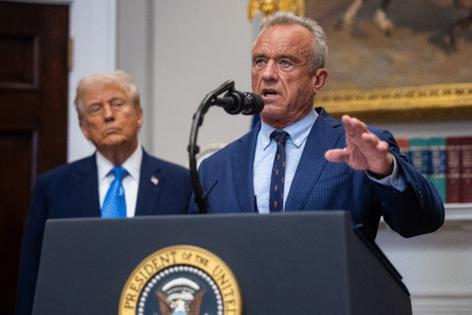Trump, officials link Tylenol to autism as medical community balks
Published in News & Features
WASHINGTON — President Donald Trump and White House officials announced that the administration will advise against taking acetaminophen, the medicine in Tylenol, during pregnancy, citing widely discredited concerns that it could cause autism, in the latest effort rebuking long-standing public health guidance.
Top medical organizations and lawmakers have widely panned Health and Human Services Secretary Robert F. Kennedy Jr. for promoting the theory as he looks to fulfill his promise to find the root causes of autism.
“Taking Tylenol, it’s not good. I’ll say it — it’s not good,” the president said from the White House on Monday, flanked by Kennedy and Centers for Medicare and Medicaid Services Director Mehmet Oz. He said pregnant women should only take Tylenol if they have a fever and cannot “tough it out.”
The Food and Drug Administration will update the safety label on acetaminophen, recommending limited use during pregnancy and among infants and toddlers. HHS will also launch a nationwide public service campaign to inform families of the change.
The White House recommended the use of the drug leucovorin, a form of folate, as a potential autism treatment. Medicaid will cover the drug for autism and the National Institutes of Health will launch trials to research the impact of leucovorin. NIH will invest $50 million in autism research.
Senate Health, Education, Labor and Pensions Chair Bill Cassidy, R-La., called the link between Tylenol and autism “bogus” during a Sept. 6 interview.
“There’s a lot of data showing that’s not the case, and I would suggest that’s probably not valid,” Cassidy said. His office did not return a request for comment on Monday.
Tylenol is one of the only over-the-counter medications deemed safe to treat fever or pain during pregnancy. Obstetricians repeatedly warn patients against long-term use.
The announcement comes at a moment when trust in public health is rapidly crumbling. Congress heard testimony from former Centers for Disease Control and Prevention leaders regarding Kennedy’s influence pushing public health policy regardless of evidence. On Thursday and Friday, newly appointed CDC vaccine experts made significant changes to the childhood vaccine schedule, despite scant evidence supporting the changes.
Trump, in free-ranging comments touching on subjects beyond Monday’s announcement, took the opportunity to criticize all the vaccines given to children in the first year of life, seemingly linking vaccines to autism.
“They pump so much stuff into those beautiful little babies. It’s a disgrace. It looks like they’re pumping into a horse,” Trump said.
He said the measles, mumps and rubella vaccine should be broken up into three separate shots because there are “no downsides” to doing so. Last week, CDC vaccine advisers recommended against administering the combined measles, mumps, rubella and varicella vaccine to children before age 4. Instead, two separate shots would be recommended: an MMR vaccine and a separate varicella shot for chicken pox.
Trump said “there’s a lot of common sense” in spacing out all combined vaccines, though didn’t explain further. “I’m not a doctor but I’m giving my opinion.”
He also said that babies should not be given the hepatitis B vaccine, describing the disease as sexually transmitted, though children can get if from other factors. He suggested the first dose be given to kids at age 12.
Finding the root of autism is one of Kennedy’s main priorities. Soon after taking office he pledged to identify the cause by September. The second “Make America Healthy Again” report, released earlier this month, reiterates that goal.
The announcement was widely criticized by experts, who note numerous studies have found that there is no demonstrable causal link.
The Society for Maternal Fetal Medicine, the American College of Obstetricians and Gynecologists, the Autism Science Foundation and even the U.S. Food and Drug Administration says acetaminophen is safe for use in pregnancy.
“To date, FDA has not found clear evidence that appropriate use of acetaminophen during pregnancy causes adverse pregnancy, birth, neurobehavioral, or developmental outcomes,” the FDA website read on Monday morning prior to Kennedy’s announcement.
The Arc, a prominent nationwide disability rights group, warned that Kennedy’s claims create stigma and takes the autism community backwards.
“Families deserve research and policies that strengthen futures and ensure access to Medicaid, special education, Social Security, and SNAP. At a time when these lifelines are being chipped away, families need assurance that the supports keeping them afloat will be protected,” Arc Communications Director Jackie Dilworth said in a statement.
Steven J. Fleischman, president of the American College of Obstetricians and Gynecologists, said the Trump administration’s logic was “dangerously simplistic,” and ignores bodies of scientific research. The organization supports use of the medication in pregnancy.
“It is highly unsettling that our federal health agencies are willing to make an announcement that will affect the health and well-being of millions of people without the backing of reliable data,” Fleischman said.
When a reporter asked Trump about his statements contradicting medical groups, he brushed aside any concern.
“That’s the establishment. They’re funded by lots of different groups,” Trump replied.
_____
Sandhya Raman contributed to this report.
_____
©2025 CQ-Roll Call, Inc., All Rights Reserved. Visit cqrollcall.com. Distributed by Tribune Content Agency, LLC.










Comments